Brussels Imposes Higher Tariffs on Electric Cars from China; Berlin Prioritizes Discussions
The EU Commission has decided during its ongoing competition investigation that electric vehicles in China receive "unfair subsidies," which could lead to economic harm for European manufacturers. The commission intends to initially hold talks with Chinese authorities and businesses. If no solution is found, the current 10% tariff on Chinese electric vehicles could rise drastically, with BYD facing a 17.4% surcharge, Geely seeing a 20% surcharge, and SAIC dealing with a 38.1% surcharge.
Although the current tariff increase is greater than anticipated, it is much lower than the US's. On May 16th, America declared their intention to raise taxes on Chinese electric cars from 25% to 100%. Brussels is concerned about China exporting its subsidized cars to Europe instead. EU Commission head von der Leyen had promised to respond "more precisely targeted" than Washington.
Transport Minister Wissing was displeased with the EU's decision: "EU Commission tariffs harm German firms and their signature products," he posted on the instant messaging service X. "More competition, open markets, and far better conditions in the EU should make cars more affordable, not through trade wars and market closures."
Both Federal Chancellor Olaf Scholz (SPD) and his recently retired analogue, Angela Merkel, had spoken out repeatedly against tariffs. Nevertheless, government spokesman Steffen Hebestreit expressed relief over the negotiating window extending until July 4th: "There is still time, and that would be ideal if a mutually satisfying solution can be found," he asserted in Berlin.
The German automotive sector vigorously denounced the Brussels choice. The head of the Association of the German Automotive Industry (VDA), Hildegard Müller, described it as "yet another step away from global cooperation." The likelihood of a worldwide trade conflict increases with this.
If BMW or Tesla, both of which have shifted their production to China, ship their goods from China to the EU, an average tariff of 21% would apply. However, the businesses can apply for individual alterations in Brussels. For German customers, this could result in higher costs for electric vehicles.
The German Industry Association (BDI) supported the Brussels move: China has breached the guidelines of the World Trade Organization (WTO). To fight back, the EU Commission's use of "defensive tools" is appropriate. They must now strive to minimize the negative effects on European companies.
Stark responses came from China itself. The Chinese Chamber of Commerce in the EU (CCCEU) was "stunned" and "deeply disappointed." The EU Commission is engaging in "protectionist" trade policies. China had previously warned Brussels against imposing tariffs.
In Brussels, France had pushed hard for the tariff increases. French automakers are less present in China than German ones.
To overturn the commission's decision, significant obstacles exist: Germany must unite 15 member states in the Council of Ministers who collectively represent at least 65% of the EU's population. If this is not feasible, the tentative sanctions will become permanent after a few months.
Read also:
- The EU Commission's focus during its competition investigation with China revolves around the alleged 'unfair subsidies' for electric vehicles, potentially causing economic harm to European manufacturers.
- Discussions between the EU Commission and Chinese authorities and businesses are planned, aiming to find a solution to the perceived issue.
- If a resolution is not reached, the current 10% tariff on Chinese electric cars might significantly increase, impacting companies like BYD with a 17.4% surcharge, Geely with a 20% surcharge, and SAIC facing a 38.1% surcharge.
- In a contrast to the anticipated increase, the US has announced its intention to raise taxes on Chinese electric cars from 25% to 100%.
- Germany, particularly its automotive sector, is concerned about China exporting subsidized electric cars to Europe instead.
- EU Commission head von der Leyen has pledged to respond with "more precisely targeted" measures than the US.
- Volker Wissing, the head of Germany's FDP party, criticized the EU's decision, arguing that higher tariffs harm German companies and their products.
- The negotiating window for finding a mutually satisfactory solution with China has been extended until July 4th, according to Berlin government spokesman Steffen Hebestreit.
- The Chinese Chamber of Commerce in the EU (CCCEU) expressed shock and disappointment at the EU Commission's proposed protectionist trade policies.
- French automakers, less present in China than German companies, advocated for the tariff increases in Brussels.
- To challenge the EU Commission's decision, Germany must secure the support of 15 member states in the Council of Ministers, representing at least 65% of the EU's population, or the tentative sanctions will become permanent after a few months.







